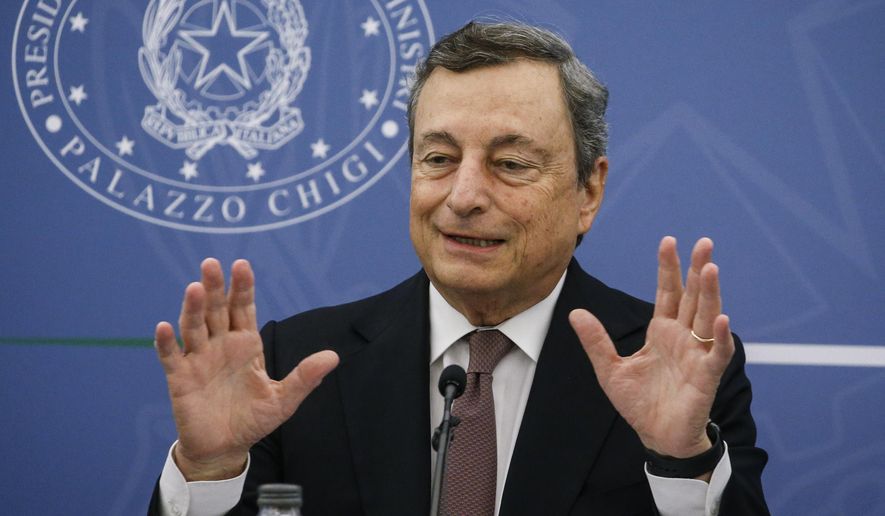ROME — Italy has bucked its reputation for less-than-stellar public administration by acting quickly to fight the coronavirus’ omicron variant. It was the first member of the European Union to shut down travel from seven southern African countries and further tightened what were already the continent’s strictest measures against COVID-19.
The threat gave Italian Prime Minister Mario Draghi a reprieve from increasing accusations of veering toward Mussolini-like authoritarianism. During a honeymoon period, the 74-year-old economist was hailed as a potential successor to outgoing German Chancellor Angela Merkel as the most effective and respected voice on the continent. Now, people across the political spectrum say the prime minister has gone too far.
Mario Bacco, a coroner and leader of a movement against pandemic restrictions, questions whether a “green pass” and other measures are effective or worth giving up freedoms.
“What is the use of insisting on vaccinations when they will not protect us from new variants?” he asked. “We cannot deny the reality of the virus, but the green pass is intolerable.”
Italian police have been empowered to check whether patrons in trattorias and bars have a “super” green pass certifying that they are either vaccinated or have recently recovered from COVID-19, according to an Associated Press account. Smartphone applications have been updated to prevent entry to concerts, movies and performances, even to those who can provide proof of negative tests for coronavirus infection.
The measures run through Jan. 15.
Mr. Draghi is no stranger to making tough decisions. As the head of the European Central Bank, he is credited with saving the euro from imploding during the 2008-2009 financial crisis. When he was coaxed out of retirement to become prime minister in February, he speculated that leading an unstable government and preventing a financial collapse might be his most formidable job yet.
It looks like he was right.
“Draghi does not come from a typical political background, and he was a kind of national celebrity because of his high-profile success at the ECB, and that allowed him to take on problems in a different way,” Flavio Chiapponi, a professor of political communications at Italy’s University of Pavia, said in an interview. “But that has its limits.”
The debate is particularly fraught because Italy emerged early last year as the first major COVID-19 epicenter outside China. Residents have not forgotten the images of overburdened hospital systems and corpses piled up in makeshift morgues.
With those grim memories still fresh, Mr. Draghi instituted what are considered the strictest health rules of any democracy. Anyone employed outside their home must have a valid health certificate, obtainable via vaccination or a negative COVID-19 test every 48 hours. Without that pass, workers risk suspension without pay.
Starting this week, even a negative test isn’t enough. Only those with a “super green pass,” proving vaccination or antibodies from a recent bout of COVID-19, are allowed to patronize restaurants, bars or other indoor facilities.
On Dec. 1, Italy became the first member of the European Union to vaccinate children as young as 5. The next day, several Italian cities, including Rome, mandated mask use outdoors when adequate social distancing is not possible.
‘Draghistan’
Gandolfo Dominici, a management professor at the University of Palermo, dubbed the government “Draghistan,” a nod to the authoritarian regimes of Central Asia such as Turkmenistan and Afghanistan. “It’s clear we are living in a totalitarian regime,” he said.
Still, Mr. Draghi has the support of more than two-thirds of respondents in opinion polls. But the term “Draghistan” has become a popular hashtag and meme on Italian social media, and the energy on the streets is with those who resist the vaccine mandates and social restrictions.
Mr. Dominici is part of a small, vocal group of professors, researchers and authors who stress that they are not opposed to vaccinations but reject the use of the green pass as unconstitutional and discriminatory. More than 1,000 university staffers have signed a petition calling for the government to pull back the green pass rules.
The emergence of the omicron variant has quieted the movement — at least for now.
Attendance at anti-green-pass events has dwindled over the past couple of weeks, and news reports about the movement have largely been replaced by coverage of the new variant. Italy’s infection rate has been creeping higher but is far below those of comparable countries in Europe.
On Tuesday, Italy recorded more than 15,000 new coronavirus infections for the first time since April. Adjusted for population, that equals about 85,000 infections in the U.S., which recorded just over 120,000 new infections on Wednesday. Germany, France and the United Kingdom, which have populations roughly equivalent to Italy’s, recorded about 50,000 new infections.
Italy’s government credits its aggressive vaccination campaign for its relative success in keeping the pandemic’s fourth wave under control. The country has vaccinated at least 85% of its residents 12 or older, but the movement against the green pass remains undeterred.
Edoardo Sylos Labini, an actor, film director and leader of the movement, said it was ironic that the omicron variant was first identified in South Africa because it was creating a “vaccine apartheid” in Italy, a reference to the system of racial and economic segregation that existed in South Africa until the 1990s.
“Why are the discussions about vaccinations but not therapies?” Mr. Sylos Labini said. “We don’t know the impacts vaccinations will have on us or on children. If we don’t develop treatments for the infected, we will never get out of this pandemic.”




Please read our comment policy before commenting.